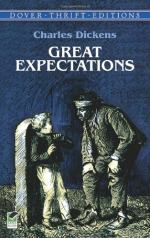“Not so much so?”
“No.”
She fired when she asked the last question, and she slapped my face with such force as she had, when I answered it.
“Now?” said she. “You little coarse monster, what do you think of me now?”
“I shall not tell you.”
“Because you are going to tell, up-stairs. Is that it?”
“No,” said I, “that’s not it.”
“Why don’t you cry again, you little wretch?”
“Because I’ll never cry for you again,” said I. Which was, I suppose, as false a declaration as ever was made; for I was inwardly crying for her then, and I know what I know of the pain she cost me afterwards.
We went on our way up-stairs after this episode; and, as we were going up, we met a gentleman groping his way down.
“Whom have we here?” asked the gentleman, stopping and looking at me.
“A boy,” said Estella.
He was a burly man of an exceedingly dark complexion, with an exceedingly large head and a corresponding large hand. He took my chin in his large hand and turned up my face to have a look at me by the light of the candle. He was prematurely bald on the top of his head, and had bushy black eyebrows that wouldn’t lie down but stood up bristling. His eyes were set very deep in his head, and were disagreeably sharp and suspicious. He had a large watchchain, and strong black dots where his beard and whiskers would have been if he had let them. He was nothing to me, and I could have had no foresight then, that he ever would be anything to me, but it happened that I had this opportunity of observing him well.
“Boy of the neighbourhood? Hey?” said he.
“Yes, sir,” said I.
“How do you come here?”
“Miss Havisham sent for me, sir,” I explained.
“Well! Behave yourself. I have a pretty large experience of boys, and you’re a bad set of fellows. Now mind!” said he, biting the side of his great forefinger as he frowned at me, “you behave yourself!”
With those words, he released me — which I was glad of, for his hand smelt of scented soap — and went his way down-stairs. I wondered whether he could be a doctor; but no, I thought; he couldn’t be a doctor, or he would have a quieter and more persuasive manner. There was not much time to consider the subject, for we were soon in Miss Havisham’s room, where she and everything else were just as I had left them. Estella left me standing near the door, and I stood there until Miss Havisham cast her eyes upon me from the dressing-table.
“So!” she said, without being startled or surprised; “the days have worn away, have they?”
“Yes, ma’am. To-day is—”
“There, there, there!” with the impatient movement of her fingers. “I don’t want to know. Are you ready to play?”
I was obliged to answer in some confusion, “I don’t think I am, ma’am.”
“Not at cards again?” she demanded, with a searching look.




